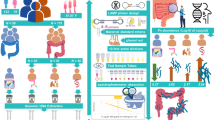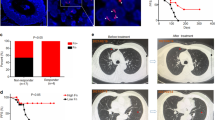Abstract
Fusobacterium nucleatum is an identified proinflammatory autochthonous bacterium implicated in human colorectal cancer. It is also abundantly found in patients suffering from chronic gut inflammation (inflammatory bowel disease), consequently contributing to the pathogenesis of colorectal cancer. Majority of the studies have reported that colorectal tumors/colorectal adenocarcinomas are highly enriched with F. nucleatum compared to noninvolved adjacent colonic tissue. During the course of multistep development of colorectal cancer, tumors have evolved many mechanisms to resist the antitumor immune response. One of such favorite ploy is providing access to pathogenic bacteria, especially F. nucleatum in the colorectal tumor microenvironment, wherein both (colorectal tumors and F. nucleatum) exert profound effect on each other, consequently attracting tumor-permissive myeloid-derived suppressor cells, suppressing cytotoxic CD8+ T cells and inhibiting NK cell-mediated cancer cell killing. In this review, we have primarily focused on how this bug modulates the immune response, consequently rendering the antitumor immune cells inactive.

Similar content being viewed by others
References
Kostic AD et al. Fusobacterium nucleatum potentiates intestinal tumorigenesis and modulates the tumor-immune microenvironment. Cell Host Microbe. 2013;14(2):207–15.
Rubinstein MR et al. Fusobacterium nucleatum promotes colorectal carcinogenesis by modulating E-cadherin/beta-catenin signaling via its FadA adhesin. Cell Host Microbe. 2013;14(2):195–206.
Tahara T et al. Fusobacterium in colonic flora and molecular features of colorectal carcinoma. Cancer Res. 2014;74(5):1311–8.
Sears CL, Garrett WS. Microbes, microbiota, and colon cancer. Cell Host Microbe. 2014;15(3):317–28.
Bashir A et al. Fusobacterium nucleatum: an emerging bug in colorectal tumorigenesis. Eur J Cancer Prev. 2015;24(5):373–85.
Tjalsma H et al. A bacterial driver-passenger model for colorectal cancer: beyond the usual suspects. Nat Rev Microbiol. 2012;10(8):575–82.
Ford AC, Moayyedi P, Hanauer SB. Ulcerative colitis. BMJ. 2013;346:f432.
Yang T et al. Microbiota impact on the epigenetic regulation of colorectal cancer. Trends Mol Med. 2013;19(12):714–25.
Jess T, Rungoe C, Peyrin-Biroulet L. Risk of colorectal cancer in patients with ulcerative colitis: a meta-analysis of population-based cohort studies. Clin Gastroenterol Hepatol. 2012;10(6):639–45.
Couturier-Maillard A et al. NOD2-mediated dysbiosis predisposes mice to transmissible colitis and colorectal cancer. J Clin Invest. 2013;123(2):700–11.
Jostins L et al. Host-microbe interactions have shaped the genetic architecture of inflammatory bowel disease. Nature. 2012;491(7422):119–24.
Gevers D et al. The treatment-naive microbiome in new-onset Crohn's disease. Cell Host Microbe. 2014;15(3):382–92.
Kostic AD, Xavier RJ, Gevers D. The microbiome in inflammatory bowel disease: current status and the future ahead. Gastroenterology. 2014;146(6):1489–99. doi:10.1053/j.gastro.2014.02.009.
Minot S et al. The human gut virome: inter-individual variation and dynamic response to diet. Genome Res. 2011;21(10):1616–25. doi:10.1101/gr.122705.111.
Norman JM, Handley SA, Virgin HW. Kingdom-agnostic metagenomics and the importance of complete characterization of enteric microbial communities. Gastroenterology. 2014;146(6):1459–69. doi:10.1053/j.gastro.2014.02.001.
Virgin HW. The virome in mammalian physiology and disease. Cell. 2014;157(1):142–50.
Belkaid Y, Hand TW. Role of the microbiota in immunity and inflammation. Cell. 2014;157(1):121–41.
Cario E. Microbiota and innate immunity in intestinal inflammation and neoplasia. Curr Opin Gastroenterol. 2013;29(1):85–91.
Sansone P, Bromberg J. Environment, inflammation, and cancer. Curr Opin Genet Dev. 2011;21(1):80–5.
Liu H, Redline RW, Han YW. Fusobacterium nucleatum induces fetal death in mice via stimulation of TLR4-mediated placental inflammatory response. J Immunol. 2007;179(4):2501–8.
Swidsinski A et al. Acute appendicitis is characterised by local invasion with Fusobacterium nucleatum/necrophorum. Gut. 2011;60(1):34–40.
Irrazabal T et al. The multifaceted role of the intestinal microbiota in colon cancer. Mol Cell. 2014;54(2):309–20.
McCoy AN et al. Fusobacterium is associated with colorectal adenomas. PLoS One. 2013;8(1):e53653.
Dharmani P et al. Fusobacterium nucleatum infection of colonic cells stimulates MUC2 mucin and tumor necrosis factor alpha. Infect Immun. 2011;79(7):2597–607.
Castellarin M et al. Fusobacterium nucleatum infection is prevalent in human colorectal carcinoma. Genome Res. 2012;22(2):299–306.
Kostic AD et al. Genomic analysis identifies association of Fusobacterium with colorectal carcinoma. Genome Res. 2012;22(2):292–8.
Marchesi JR et al. Towards the human colorectal cancer microbiome. PLoS One. 2011;6(5):e20447. doi:10.1371/journal.pone.0020447.
Strauss J et al. Invasive potential of gut mucosa-derived Fusobacterium nucleatum positively correlates with IBD status of the host. Inflamm Bowel Dis. 2011;17(9):1971–8.
Kostic AD et al. Microbes and inflammation in colorectal cancer. Cancer Immunol Res. 2013;1(3):150–7.
Vander Heiden MG, Cantley LC, Thompson CB. Understanding the Warburg effect: the metabolic requirements of cell proliferation. Science. 2009;324(5930):1029–33.
Mima K et al. Fusobacterium nucleatum and T cells in colorectal carcinoma. JAMA Oncol. 2015;1(5):653–61.
Moretta L et al. Human natural killer cells: origin, clonality, specificity, and receptors. Adv Immunol. 1994;55:341–80.
Levin AM et al. Exploiting a natural conformational switch to engineer an interleukin-2 ‘superkine’. Nature. 2012;484(7395):529–33.
Koch J et al. Activating natural cytotoxicity receptors of natural killer cells in cancer and infection. Trends Immunol. 2013;34(4):182–91. doi:10.1016/j.it.2013.01.003.
Seidel E, Glasner A, Mandelboim O. Virus-mediated inhibition of natural cytotoxicity receptor recognition. Cell Mol Life Sci. 2012;69(23):3911–20. doi:10.1007/s00018-012-1001-x.
Gur C et al. Binding of the Fap2 protein of Fusobacterium nucleatum to human inhibitory receptor TIGIT protects tumors from immune cell attack. Immunity. 2015;42(2):344–55. doi:10.1016/j.immuni.2015.01.010.
Chen DS, Mellman I. Oncology meets immunology: the cancer-immunity cycle. Immunity. 2013;39(1):1–10.
Kalos M, June CH. Adoptive T cell transfer for cancer immunotherapy in the era of synthetic biology. Immunity. 2013;39(1):49–60.
Palucka K, Banchereau J. Dendritic-cell-based therapeutic cancer vaccines. Immunity. 2013;39(1):38–48.
van den Boorn JG, Hartmann G. Turning tumors into vaccines: co-opting the innate immune system. Immunity. 2013;39(1):27–37.
Crespo J et al. T cell anergy, exhaustion, senescence, and stemness in the tumor microenvironment. Curr Opin Immunol. 2013;25(2):214–21. doi:10.1016/j.coi.2012.12.003.
Schietinger A, Greenberg PD. Tolerance and exhaustion: defining mechanisms of T cell dysfunction. Trends Immunol. 2014;35(2):51–60. doi:10.1016/j.it.2013.10.001.
Johnston RJ et al. The immunoreceptor TIGIT regulates antitumor and antiviral CD8(+) T cell effector function. Cancer Cell. 2014;26(6):923–37. doi:10.1016/j.ccell.2014.10.018.
Acknowledgments
The authors gratefully acknowledge the support provided by University of Kashmir, Srinagar. The contributions made by Mudassir Habib, Samirul Bashir, and Nazia Hilal from the Department of Biotechnology, University of Kashmir are acknowledged.
Author information
Authors and Affiliations
Corresponding author
Ethics declarations
Conflicts of interest
None
Rights and permissions
About this article
Cite this article
Bashir, A., Miskeen, A.Y., Hazari, Y.M. et al. Fusobacterium nucleatum, inflammation, and immunity: the fire within human gut. Tumor Biol. 37, 2805–2810 (2016). https://doi.org/10.1007/s13277-015-4724-0
Received:
Accepted:
Published:
Issue Date:
DOI: https://doi.org/10.1007/s13277-015-4724-0




